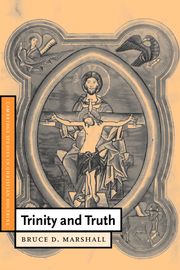Book contents
- Frontmatter
- Contents
- Preface
- A note on translations
- 1 Introduction: theology and truth
- 2 The triune God as the center of Christian belief
- 3 Epistemic justification in modern theology
- 4 Problems about justification
- 5 The epistemic primacy of belief in the Trinity
- 6 Epistemic priorities and alien claims
- 7 The epistemic role of the Spirit
- 8 The concept of truth
- 9 Trinity, truth, and belief
- Index
3 - Epistemic justification in modern theology
Published online by Cambridge University Press: 23 December 2009
- Frontmatter
- Contents
- Preface
- A note on translations
- 1 Introduction: theology and truth
- 2 The triune God as the center of Christian belief
- 3 Epistemic justification in modern theology
- 4 Problems about justification
- 5 The epistemic primacy of belief in the Trinity
- 6 Epistemic priorities and alien claims
- 7 The epistemic role of the Spirit
- 8 The concept of truth
- 9 Trinity, truth, and belief
- Index
Summary
Though extended explicit discussions of the topic are uncommon in modern Christian theology, we can identify five assumptions or implicit theses about epistemic justification and truth which have proven deeply persistent since the late seventeenth century. This chapter will concentrate on three theses about justification:
(1) An interiority thesis, according to which Christian beliefs are justified to the extent that they adequately express certain inner experiences.
(2) A foundationalist thesis, according to which justified beliefs (including Christian ones) must either be tied in virtue of their meaning to selfevident or incorrigible data, or logically grounded in beliefs which are.
(3) An epistemic dependence thesis, according to which the primary criteria for deciding about the truth of Christian beliefs, at least in part and perhaps as a whole, must not themselves be distinctively Christian.
While none of these three epistemic claims logically requires either of the others, they have tended to go together in modern theology (especially the first two). Two further theses, one having to do with justification, the other with truth, will come up for discussion in later chapters.
(4) A pragmatic thesis, according to which Christian beliefs are justified by the communal and individual practices bound up with holding them true (chapter 7).
(5) A correspondence thesis, according to which the truth of beliefs, including Christian ones, consists in their agreement or correspondence with reality (chapters 8–9).
As the examples which follow will suggest, part of the staying power of the assumptions about justification with which this chapter will be concerned has lain in their susceptibility to ongoing reformulation and improvement.
- Type
- Chapter
- Information
- Trinity and Truth , pp. 50 - 71Publisher: Cambridge University PressPrint publication year: 1999

